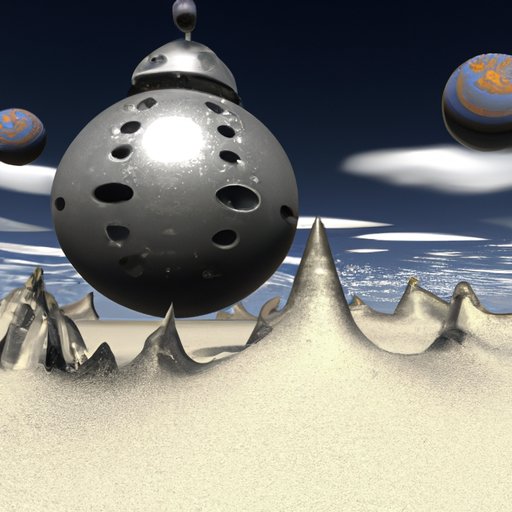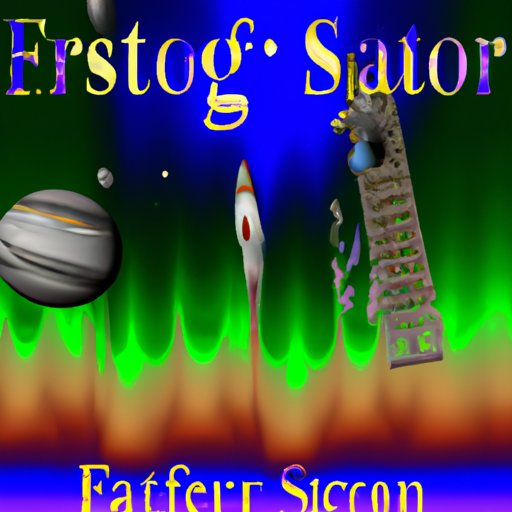Introduction
Science fiction is a genre of speculative fiction that has captivated audiences for centuries. It is a form of literature that often uses scientific speculation and futuristic settings to explore various themes, such as technology, space exploration, time travel, and artificial intelligence. In this article, we will take a look at the history of science fiction, its various subgenres and themes, as well as some of the most influential authors and works in the genre. Finally, we will explore what the future may hold for science fiction.

Overview of the Science Fiction Genre
Science fiction has been around for centuries, with roots in ancient mythology and legends. As technology advanced, so did the genre, evolving into the form we know today. According to author and editor David Hartwell, “Science fiction is the literature of change, of the world not being what it was or what it will be, but what it might be.”
The genre can be divided into several subgenres, such as hard science fiction, military science fiction, cyberpunk, steampunk, and space opera. Each of these subgenres has its own unique characteristics and themes. For example, hard science fiction typically focuses on the scientific accuracy of the story, while military science fiction focuses on warfare and warfare technology.
Science fiction has had a profound impact on popular culture, from movies and television shows to video games and comic books. Many iconic characters and stories from science fiction have become part of our collective cultural consciousness. From Star Trek to Star Wars, science fiction has inspired a generation of dreamers, inventors, and creators.

Themes and Motifs in Science Fiction
Science fiction often explores themes such as technology, progress, and the human condition. Common elements of the genre include aliens, robots, time travel, interplanetary and interstellar travel, artificial intelligence, and dystopian societies. These elements are used to explore questions of morality, ethics, and the implications of technological advancement.
One of the most famous examples of science fiction is Mary Shelley’s Frankenstein, which explores the consequences of playing God and creating life. Other classic works such as H.G. Wells’ The Time Machine and Aldous Huxley’s Brave New World explore the implications of time travel and the effects of social engineering, respectively.
Notable Authors and Works in the Science Fiction Genre
Throughout its history, science fiction has been shaped by a number of influential authors and works. Isaac Asimov, Arthur C. Clarke, and Robert A. Heinlein are just a few of the authors who have left their mark on the genre. Some of their most famous works include Asimov’s I, Robot, Clarke’s 2001: A Space Odyssey, and Heinlein’s Starship Troopers.
Other classic works of science fiction include Ray Bradbury’s Fahrenheit 451, George Orwell’s Nineteen Eighty-Four, and Philip K. Dick’s Do Androids Dream of Electric Sheep? These works have all had a lasting impact on the genre, inspiring countless other authors and works.

What the Future Holds for Science Fiction
As technology continues to advance, the possibilities for science fiction are seemingly endless. Advances in artificial intelligence, virtual reality, and robotics will no doubt open the door to new and exciting stories. Additionally, the increasing popularity of science fiction in popular culture means that the genre is likely to remain relevant and popular for many years to come.
In the words of author and physicist David Brin, “Science fiction is the only literature that explores how we might improve the future.” With advances in technology and an ever-growing audience, science fiction is sure to continue to evolve and inspire for many years to come.
Conclusion
Science fiction is a genre that has captivated audiences for centuries. From its origins in ancient mythology to its current form as a popular genre, science fiction has evolved and adapted to the changing times. This article explored the history of the genre, its various subgenres and themes, as well as some of the most influential authors and works. Finally, we looked at what the future may hold for science fiction, from advances in technology to its increasing popularity.
As technology continues to advance and the boundaries between science and fiction continue to blur, science fiction will no doubt continue to excite and inspire for generations to come.
(Note: Is this article not meeting your expectations? Do you have knowledge or insights to share? Unlock new opportunities and expand your reach by joining our authors team. Click Registration to join us and share your expertise with our readers.)
